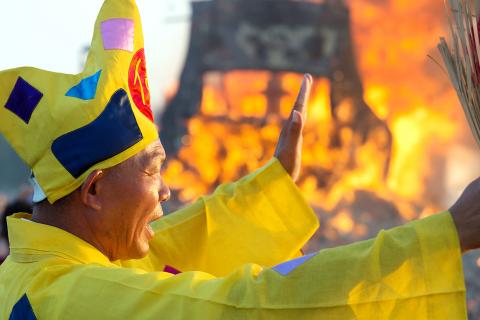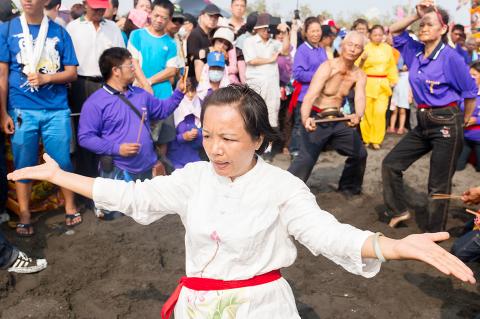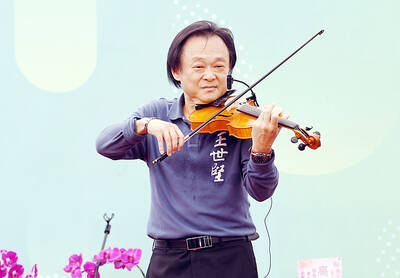Every three years, hundreds, if not thousands, of people gather on a beach in Donggang, Pingtung County. They’re there for a whole night, to watch the ritual burning of a fully seaworthy and functional traditional sailing junk, created especially for the ceremony.
The boat burning marks the end of a week of events — often in October — that begins when five deities known as Wangye, or royal lords, arrive in Donggang from across the sea.
The week starts with the Wangye being called down to earth and welcomed in an elaborate ceremony on the same beach. Spirit mediums offer their bodies up for possession by the Wangye to be able to communicate with them and determine who is who. This is done so they can identify their leader, the identity of whom was determined in a ceremony at the temple the day before.

Photo: Perry Svensson, Taipei Times
照片:台北時報記者蘇沛攝
The burning of the boat is the grand sending off of the Wangye, who will return again three years later, and the week’s religious events and rituals are intended to cleanse the area around Donggang of evil and disease for the next three years.
The next boat burning in Donggang will take place next year. The date will, as always, be determined after divine consultations at the Donglong Temple in Donggang.
(Perry Svensson, Taipei Times)

Photo: Perry Svensson, Taipei Times
台北時報記者蘇沛攝
每三年一次,屏東縣的東港海邊聚集成千上百的民眾,他們在海邊守候一整夜,只為觀看一艘航海配備完整的傳統帆船被大火吞噬。這艘船正是為燒王船儀式特別打造的。
燒王船的儀式為東港迎王平安祭典的壓軸。祭典通常在十月舉辦,為期一週,從迎接五位千歲爺渡海駕臨起拉開序幕。
祭典的第一個活動為在東港海邊迎請千歲爺駕臨。儀式中,乩童讓千歲爺附身以與之溝通,並辨別駕臨神祇的身分,以確定哪個乩童體內的才是負責帶頭的神明。每年負責帶頭的神明都是祭典前一天晚上才經請示儀式決定的。

Photo: Perry Svensson, Taipei Times
照片: 台北時報記者蘇沛攝
燒王船為送千歲爺離開時所舉辦的儀式,而離開後的千歲爺將在三年後重返。一整週的祭典活動旨在淨化東港地區,讓未來三年可免於災厄邪靈。
下一次的東港燒王船活動將在明年舉辦。一如往例,確切的日期會在東隆宮請示神明後決定。
(台北時報編譯涂宇安譯)

A: Hey, the world’s major dictionaries just unveiled their words of the year for 2025. B: Yup, the Cambridge Dictionary chose the word “parasocial,” which refers to a connection that someone feels between themselves and a famous person they don’t really know. A: One-sided parasocial relationships with celebrities, influencers and even AI chatbots have clearly become more common. B: The Oxford Dictionary picked “rage bait” — online content designed to elicit anger by being frustrating, provocative or offensive in order to increase traffic to Web sites or social media accounts. A: The Collins Dictionary picked “vibe coding.” Let’s

A: Apart from the world’s major dictionaries, the online Dictionary.com actually picked “67” as its word of the year. B: What does “67” even mean? A: Even the dictionary wasn’t exactly sure about its meaning. The slang term’s origin might be traced to US rapper Skrilla’s song Doot Doot (67). Aren’t Taiwanese media outlets choosing the Mandarin word for 2025? B: Yeah and after hearing the song Good-for-Nothing, adapted from some catchphrases of Legislator Wang Shih-chien, I’m going to vote for the character “tsung” (hasty) from the lyrics. A: Hopefully, in the new year, we’ll be calm as the

Sea star wasting disease (SSWD) is a strange and serious illness affecting sea stars, or starfish. This disease causes sea stars to develop painful lesions, lose their arms, and eventually turn into a gooey, melted mess. Since it was first observed in 2013, millions of sea stars along the Pacific coast of North America have died from this __1__. Although viruses were once considered a possible cause, researchers now believe that environmental stressors and microorganisms are primarily __2__ for sea star wasting disease. One of the main environmental triggers appears to be warmer ocean water. When the water heats

For many people in Taiwan, childhood memories of rural life include pig pens standing beside family homes. Leftover rice, vegetable scraps and soup from daily meals were poured into buckets and fed to pigs. This practice of feeding pigs with household food waste was once a common way of life, both an economic choice and an expression of agricultural society’s deep respect for conserving resources. From a practical standpoint, pigs are omnivorous animals capable of efficiently digesting food scraps that humans can no longer eat. For rural households, food waste cost almost nothing, yet it could be converted into pork, a